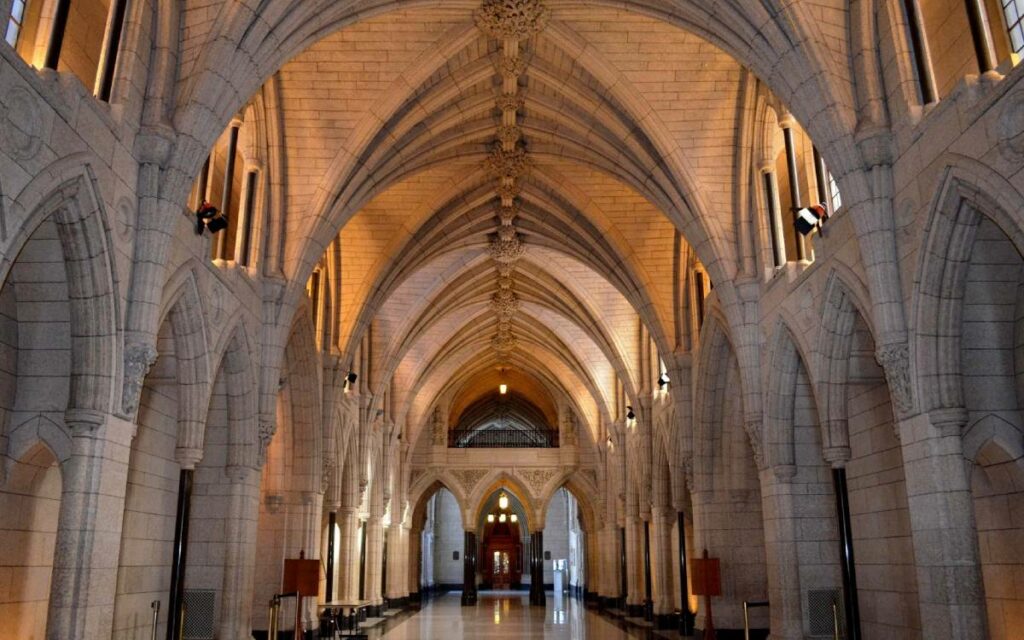
The House of Commons will rise this week for the MPs’ holiday recess. This is an appropriate time to look back at what was an extraordinary year, and select the most significant news stories from the Nation’s Capital. In no particular order, here are “the top ten” federal political stories that, argumentatively, mattered the most to Canadians in 2020.
Changing of the guard at Finance Canada – In the midst of an embarrassing scandal, the Prime Minister replaced his embattled Finance Minister Bill Morneau with his most trusted Minister-of-Everything Chrystia Freeland. Hence, the stewardship of Canada’s finances and fiscal policy went from a Toronto financial services businessman to a Toronto journalist. Morneau left town holding the undistinguished title of the worst economic record in Canadian history. On Morneau’s watch, the Trudeau Government ran $89.1 billion in accumulated deficits and its program spending increased at a striking rate of 27.2 percent in five years. While he was at the helm of Finance Canada, the government added $10,000 of new debt for every man, woman and child. His lasting legacy: Morneau outspent all past federal governments, including those governments that had to respond to world wars and global recessions.
Enter Finance Minister Freeland, who is now overseeing unbridled government spending in response to the pandemic. Canada’s current federal deficit is the largest in the world at 19.8 per cent of the country’s GDP. The Trudeau Government is the global leader in government spending with a fiscal plan that will have our federal debt double to $1.4 trillion in the next five years. In her first financial statement, Freeland offered no financial check and balances; instead, she is musing publicly about finding ways to tap into Canadians’ savings accounts.
Finance Canada also had a new Deputy Minister parachuted into its top spot. Financial Post columnist Terence Corcoran views the placement of Michael Sabia as entrenching “Trudeau’s plan to use sustainable environmental diversity, socially responsible governance and interventionism as the prime drivers of federal economic policy.” Corcoran believes the tandem of Freeland and Sabia points to increased state interventionism: “Under the new capitalism, corporate economic freedom is replaced by corporatist economic controls.”
The unaccounted for government spending – A recent CBC investigative story confirmed the Trudeau Government is spending billions seemingly without controls and with no intention of accounting for the dollars spent. Government financial statements document that Ottawa has spent $240 billion fighting COVID-19 in just eight months – that is an average of $952 million a day. The government has provided more than $81 billion financial support to 11,721,827 people – that is almost 40 per cent of all Canadian adults. It has also provided tens of billions of dollars to businesses and corporations.
The free-spending Trudeau Government has repeatedly frustrated officials and media who request a public accounting of its expenditures. To quote but one of these officials, Canada’s former Parliament Budget Officer Kevin Page states, “We should know more where that money is going… And not knowing really reduces our ability to understand how these programs are working and what role can they play in terms of supporting the economic recovery going forward.” Commenting on the recent federal economic statement, Page said, “It’s impossible to read. I have done this for years and I can’t even follow the money. I hope it’s not deliberate.”
The collapse of Canada’s resource development – In early 2020 (pre COVID-19), Calgary-based news agency, Second Street, reported that $213 billion of resource development projects had been cancelled or stalled in Canada since 2014. This astonishing total came in the wake of the announced cancellation of the $20.6 Billion Teck Frontier mine project –a prairie resource project that would have had 40 years of anticipated production, employ 2,500 workers, and generate more than $70 billion in revenue to governments. Equally devastating in early 2020 was the news about Quebec’s Energie Saguenay pipeline project losing its largest investor. Warren Buffett’s firm took $4 billion off the table and walked away from its investment in the $9 billion liquefied natural gas project. This mega resource project would have built a new 782 km pipeline corridor and a natural gas liquefaction complex at Port Saguenay.
Prior to the pandemic crises, the Trudeau Government’s natural resource development policies were making headlines as having a dramatic, negative impact on both large and small resource companies. There was much public discussion about the abandoned resource projects equating not only to lost employment but also to lost investments and future economic activity. For Canada to lose $213 billion of resource projects does not only damage our country’s current economic standing, it surely cripples the opportunities of future generations of Canadians.
The Great Reset and what it means for the Canadian economy – PM Trudeau has publicly tied the country’s COVID-19 recovery to The Great Reset and to a series of United Nations’ 2030 objectives. The PM claims: “This pandemic has provided an opportunity for a reset. This is our chance to accelerate our pre-pandemic efforts to reimagine economic systems…” Trudeau’s script is taken directly from the pages of COVID-19 – The Great Reset, which forecasts the pandemic-induced global economic downturn as providing the catalyst for a reset of capitalism.
As the Fall Throne Speech proclaimed, the Trudeau Government is intent on introducing “a bold, new progressive agenda” designed to restructure the country’s social safety net and address climate change. The Trudeau Government’s economic policies mirror those policy objectives found in The Great Reset. Current fiscal discussions include increased carbon taxes and a new wealth tax, new tax regulations respecting business and individual finances, a withdrawal of support for resource industries, new funding programs for green initiatives, and greater government intervention and social planning measures to adhere to the U.N. policy agendas.
New Conservative Leader Erin O’Toole – In August the Conservative Party elected Erin O’Toole as its new standard bearer. O’Toole grew up in a blue-collar home in southern Ontario, excelled in his pursuits as a pilot in the Canadian Forces and then as a lawyer, before becoming a Member of Parliament. As MP, he represents the community he was raised in, and where he is raising his family. At age 47, O’Toole has been in Ottawa for eight years and he is described as “a moderate” within the federal Conservative caucus.
As the Conservative Leader, O’Toole has called for the government to take a tougher stand against the Communist Party of China. He announced a Conservative Government would meet the emission targets as set out in the Paris Climate Agreement. O’Toole has been critical of the government’s pandemic spending, stating it has been mismanaged and wasteful; and, he is pressing the government for transparency with its vaccine distribution plans. O’Toole’s greatest challenge is for Canadians to come to know him and to recognize his leadership as the alternative to Justin Trudeau, with whom he will be compared in the anticipated 2021 federal election.
Next week: the remaining five 2020 news stories in federal politics.

Chris George is an advocate, government relations advisor, and writer/copy editor. As president of a public relations firm established in 1994, Chris provides discreet counsel, tactical advice and management skills to CEOs/Presidents, Boards of Directors and senior executive teams in executing public and government relations campaigns and managing issues. Prior to this PR/GR career, Chris spent seven years on Parliament Hill on staffs of Cabinet Ministers and MPs. He has served in senior campaign positions for electoral and advocacy campaigns at every level of government. Today, Chris resides in Almonte, Ontario where he and his wife manage www.cgacommunications.com. Contact Chris at chrisg.george@gmail.com.




















